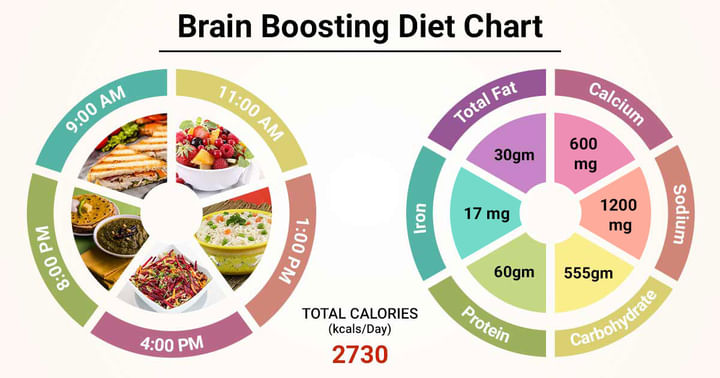Diet Chart For brain boosting
Last Updated: Jan 20, 2025
About
Recent studies have shown that the food we eat not only affects our physical health but it also impacts our brain, particularly the grey matter, adding a new dimension to the saying ‘food for thought’. Foods that are rich in vitamin and minerals, antioxidants and good fats provide energy and help in improving cognitive abilities and safeguarding against brain diseases. Therefore when we sustain ourselves with a balanced diet consisting of brain-rich foods, it can boost the brain and protect against illnesses.
There are some foods that do this job better than the others and they are as follows:
- Dark chocolate and coffee – Dark chocolate and coffee possess antioxidants and anti-inflammatory properties that help your brain. Furthermore, the flavonoids in dark chocolate and caffeine in coffee increase alertness by reducing adenosine (the chemical messenger that makes you sleepy), sharpens concentration and improves mood (secrets “feel-good” neurotransmitters such as serotonin)
- Berries – Blueberries are one of the foods richest in antioxidants including vitamins C and K and high quantities of fibre. Berries, primarily blueberries, contain something known as the gallic acid that helps the brain by reducing stress and preventing degeneration.
- Green and leafy vegetables – Research studies have shown that broccoli, celery, spinach, kale, lettuce and other green leafy vegetables are known to boost brain cells by keeping dementia at bay.
- Eggs – Eggs are a great source of nutrients such as vitamins B6 and B12 and chlorine. Chlorine is required in our bodies to produce acetylcholine which helps in regulating mood and memory. Therefore higher levels of chlorine lead to better memory and mental function.
Diet Chart
| Sunday | |
| Breakfast (8:00-8:30AM) | Chicken sandwich(4 slice bread) + 1 cup skimmed milk. |
| Mid-Meal (11:00-11:30AM) | 1 fruit portion( Berries, Pomegranate, Avacado) |
| Lunch (2:00-2:30PM) | Tofu Veg pulav rice 1.5 cup+ 1 cup Low fat curd. |
| Evening (4:00-4:30PM) | 1 cup carrot beetroot salad |
| Dinner (8:00-8:30PM) | 3 roti/ Chapathi+ spinach subji 1/2 cup. |
| Monday | |
| Breakfast (8:00-8:30AM) | chappati-3+ Egg roast 1/2 cup/ 1cup egg curry( 2 egg) |
| Mid-Meal (11:00-11:30AM) | green gram sprouts with tomato and olive oil 1 cup |
| Lunch (2:00-2:30PM) | 4 Roti+1/2 cup salad + Fish curry (Mackerel 80 gm). |
| Evening (4:00-4:30PM) | 1 fruit portion( Berries, Pomegranate, Avacado) |
| Dinner (8:00-8:30PM) | 3 Roti / chappathi.+ Tomato subji 1/2 cup. |
| Tuesday | |
| Breakfast (8:00-8:30AM) | Fermented ragi dosa 3 +Tomato /green chutney. |
| Mid-Meal (11:00-11:30AM) | 1 fruit portion( Berries, Pomegranate, Avacado) |
| Lunch (2:00-2:30PM) | 1.5 cup rice+Kidney beans curry 1 cup + Tuna fry( 80g)+ Ladies finger subji 1/2 cup. |
| Evening (4:00-4:30PM) | 1 glass milk with pumpkin seed and dark chocolate |
| Dinner (8:00-8:30PM) | Wheat dosa 3 + 1 cup Bitter guard subji. |
| Wednesday | |
| Breakfast (8:00-8:30AM) | Besan cheela 3 + 1 tbs green chutney+ 1 boiled egg |
| Mid-Meal (11:00-11:30AM) | Broccoli salad 1 cup |
| Lunch (2:00-2:30PM) | 4 chapati+Oyster roast(6 medium Oysters)+ Dhal 1/2 cup+ cucumber salad 1/2 cup. |
| Evening (4:00-4:30PM) | 1 glass badam walnut milk shake. |
| Dinner (8:00-8:30PM) | Brocken weat upma 1 cup+ 1/2 cup green beans subji |
| Thursday | |
| Breakfast (8:00-8:30AM) | Mushroom Paratha 2 + Tomato chutney. |
| Mid-Meal (11:00-11:30AM) | plane Yoghurt with raw vegetables / grilled vegetables -1 cup |
| Lunch (2:00-2:30PM) | 1.5 cup rice+ chicken curry( 150 gm chicken)+ Palak subji 1/2 cup+ 1/2 cup low fat curd. |
| Evening (4:00-4:30PM) | 1 fruit portion( Berries, Pomegranate, Avacado) |
| Dinner (8:00-8:30PM) | 3 Roti/ chapati+ Broccoli subji 1/2 cup. |
| Friday | |
| Breakfast (8:00-8:30AM) | Oats upma 1 cup + 2 boiled egg. |
| Mid-Meal (11:00-11:30AM) | 1 fruit portion( Berries, Pomegranate, Avacado) |
| Lunch (2:00-2:30PM) | 1.5 cup rice+ Mushroom curry 1/2 cup + Ladies finger subji 1/2 cup. |
| Evening (4:00-4:30PM) | 1 glass Avacado milk shake |
| Dinner (8:00-8:30PM) | 3 Roti / chappathi+Ridge guard subji 1/2 cup. |
| Saturday | |
| Breakfast (8:00-8:30AM) | Paneer Paratha 3+ Green chutney. |
| Mid-Meal (11:00-11:30AM) | 1 cup boilled chick peas with red pepper. |
| Lunch (2:00-2:30PM) | 1/2 cup rice + 3 medium chappati+ Fish masala 1 cup( Mackerel 80 g)+ Snake guard subji 1/2 cup. |
| Evening (4:00-4:30PM) | 1 fruit portion( Berries, Pomegranate, Avacado) |
| Dinner (8:00-8:30PM) | Broken wheat upma 1 cup+ 1/2 cup green beans subji |
Food Items To Limit
- Sugary Drinks- A high intake of sugary drinks may increase the risk of dementia. High-fructose corn syrup (HFCS) may be especially harmful, causing brain inflammation and impairing memory and learning.
- Refined Carbs- A high intake of refined carbs with a high glycemic index (GI) and glycemic load (GL) may impair memory and intelligence, as well as increase the risk of dementia. These include sugars and highly processed grains like white flour.
- Foods High in Trans Fats- Trans fats may be associated with impaired memory and the risk of Alzheimer's, but the evidence is mixed. Cutting out trans fats completely and increasing the unsaturated fats in your diet may be a good strategy.
- Highly Processed Foods- Processed foods contribute to excess fat around the organs, which is associated with a decline in brain tissue. Additionally, Western-style diets may increase brain inflammation and impair memory, learning, brain plasticity and the blood-brain barrier.
- Aspartame- Aspartame is an artificial sweetener found in many soft drinks and sugar-free products. It has been linked to behavioral and cognitive problems.
- Alcohol- While moderate alcohol intake can have some positive health effects, excessive consumption can lead to memory loss, behavioral changes and sleep disruption. Particularly high-risk groups include teenagers, young adults and pregnant women.
- Fish High in Mercury- Mercury is a neurotoxic element that can be particularly harmful to developing fetuses and young children. The primary source in the diet is large predatory fish such as shark and swordfish. It is best to limit your intake of fish that are high in mercury.
Do's And Dont's
Do's:
- Get adequate sleep.
- Pick berries. Studies show they protect against mental decline
- Go leafy green. These veggies are especially brain-friendly.
- Swap olive oil for butter. Butter is frowned upon in the MIND diet, and olive oil can flavor your meals in a healthier way.
- Take a Lot of Water Water is essential for the body’s well- being. Adequate amounts of water in the blood stream will not only keep you hydrated but also boost your brain power. Consumption of at least 8 glasses a day is recommended.
- Go for regular exercise.
Don'ts:
- Don't eat too much red meat. MIND followers refrain from red meats in favor of fish and poultry.
- Don't eat cheese, fried foods or fast food. These unhealthy foods are bad for your waistline and your brain, so avoid them if you can.
- Don't butter up. Stick to less than 1 tablespoon a day.
Food Items You Can Easily Consume
- Wholegrains: May help improve concentration and focus Oily fish: May help promote healthy brain function
- Blueberries: May help boost short-term memory
- Tomatoes: May help prevent free radical damage
- Eggs: May help delay brain shrinkage
- Blackcurrants: May help reduce anxiety and stress
- Pumpkin seeds: May help enhance mood and boost memory
- Broccoli: May help improve brainpower
- Sage: May help boost memory and concentration
- Nuts: May help protect healthy brain function
References
- Turner J. Your brain on food: a nutrient-rich diet can protect cognitive health. Generations. 2011 Jul 1;35(2):99-106. [Cited 01 July 2019]. Available from:
- Kiefer I. Brain food. Scientific American Mind. 2007 Oct 1;18(5):58-63. [Cited 01 July 2019]. Available from:
- Engel-Smothers H, Heim SM. Boosting Your Baby's Brain Power. Great Potential Press, Inc.; 2008 [Internet]. books.google.co.in. [Cited 01 July 2019]. Available from:
Table of content
Find Dietitian/Nutritionist near me
Ask a free question
Get FREE multiple opinions from Doctors



